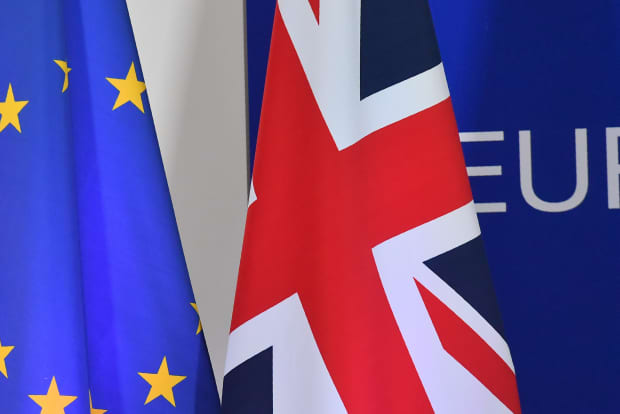This post was originally published on this site

A European Union flag and a U.K. flag during a special meeting of the European Council on November 25, 2018 in Brussels, Belgium.
AFP via Getty Images
The U.K. and the European Union have now entered either their ultimate bluffing session before striking a last-minute compromise on their future relationship, or the inexorable slide toward the “no-deal” Brexit both sides promised to avoid ever since the 2016 U.K. referendum on the country’s membership.
A summit of EU leaders on Thursday sternly noted that “progress on the key issues of interest to the Union [was] still not sufficient for an agreement to be reached,” and called on the U.K. “to make the necessary moves to make an agreement possible.”
U.K. Prime Minister Boris Johnson then retorted on Friday that the EU had “refused to negotiate seriously,” and said that the U.K. would get ready for arrangements with its biggest trade partner that would be “more like Australia” from January 1 next year, when the so-called transition period of the country’s exit from the union expires.
Translation from the two-day drama: Things go on as usual, albeit with heightened rhetoric and now tighter deadlines.
Read: U.K. will quit talks if no trade deal agreed upon by Oct. 15, Boris Johnson said in September
What mattered in Johnson’s BBC interview is what he didn’t say: After warning two weeks ago that he would walk away from the long-running trade talks if no progress had been made before the EU summit, Johnson is, in fact, ready to keep talking despite the absence of progress. His intended threat of a no-deal Brexit came with the caveat, repeated three times in the six-minute interview, that it would only happen “unless some fundamental change of approach” is perceptible on the EU side.
The EU, for its part, had urged the U.K. to keep talking, and instructed its key negotiator Michel Barnier to keep doing what he has been doing for months. And Barnier said indeed that he would be in London next week to do just that, in a meeting with his counterpart, the U.K. Brexit negotiator David Frost.
Talking about what? That will be the real question. The no-deal scenario is constantly described by Johnson and other U.K. governments ministers as the “Australian” option, meaning that the U.K. would simply trade with the EU according to the very basic, and costlier, rules of the World Trade Organization. But that is seemingly ignoring that Australia has a range of other agreements and bilateral deals with the EU — which it deems so unsatisfying that it engaged in proper free-trade negotiations with the union two years ago.
Barnier, in any case, is unlikely to come back to London just to talk about the wine trade or the mutual exchange of passenger records — topics covered by two of the current EU-Australia agreements.
So the U.K.-EU “comprehensive trade treaty” that both sides swear they want to conclude will once again depend on whether or not European fishermen will be able to keep trawling in British waters, what kind of guarantees the U.K. will give the EU that it won’t engage in a race to the bottom in environmental or social regulations, and what assurances the two sides will provide each other that the disputes will be dealt with in good faith and following strict legality.
Read: U.K. asks consumers to go easy on fish & chips – it’s all about Brexit, but there’s a catch
What has been surprising in the last two days is that the official tone set by EU leaders and Johnson was more dramatic than the upbeat noises emanating from the two sides’ negotiating teams in the preceding days. That suggests that the rhetoric ramp-up is more political than technical, and that a deal might be in sight after all, once everyone has taken the ultimate posture.

